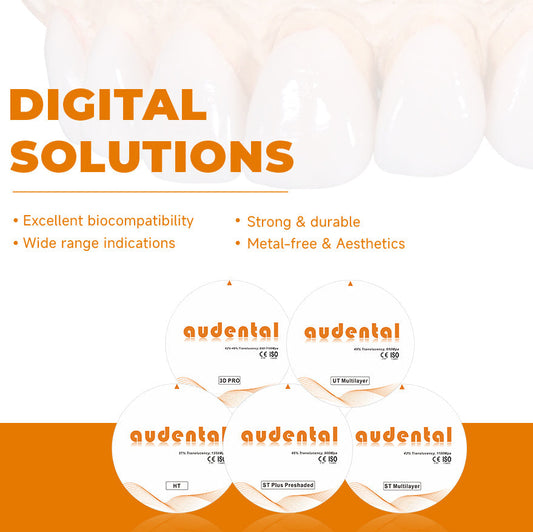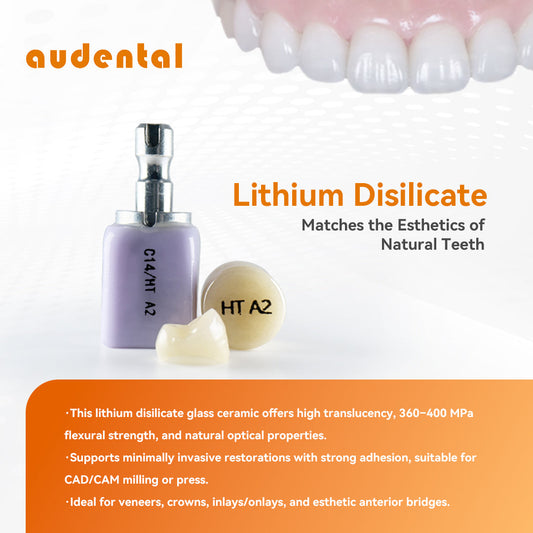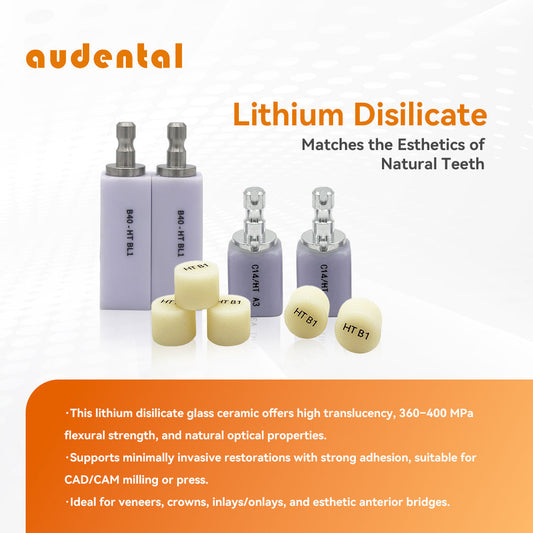Advantages of Glass Ceramics and Lithium Disilicate in Dental Restorations
Share
In modern dental restorative materials, glass ceramics are an important category. Through heat treatment and partial crystallization, these materials combine the translucency of glass with the strength of ceramics, achieving both natural aesthetics and reliable mechanical performance. This makes glass ceramics an ideal choice for crowns, inlays, veneers, and small anterior bridges.
The advantages of glass ceramics are not only in the combination of strength and aesthetics but also in their flexibility to adapt to various processing techniques. Through CAD/CAM milling, dental labs can precisely create customized restorations, while pressing techniques allow for complex shapes and high-aesthetic restorations.
Among glass ceramics, lithium disilicate is the most popular type. Through a unique material formula and crystallization process, it offers high strength (360-400 MPa), excellent translucency, and natural tooth-like optical properties. Compared to traditional glass ceramics, lithium disilicate is especially suitable for anterior and aesthetic restorations, as well as for partial crowns, inlays/onlays, and small bridges. Its balance of strength and aesthetics allows dentists to perform minimally invasive restorations while preserving the integrity of the patient’s natural teeth.
 The distinction between lithium disilicate blocks and ingots is key to their flexibility and wide application. Blocks are primarily used for CAD/CAM milling, suitable for veneers, single crowns, inlays/onlays, and small bridges. They are convenient, precise, and allow for rapid delivery. Ingots are used for pressing techniques, ideal for complex restorations, providing flexible control over color and shape to achieve highly natural aesthetics. By choosing the appropriate block or ingot, dental labs can provide high-quality, customized restorations according to different clinical needs.
The distinction between lithium disilicate blocks and ingots is key to their flexibility and wide application. Blocks are primarily used for CAD/CAM milling, suitable for veneers, single crowns, inlays/onlays, and small bridges. They are convenient, precise, and allow for rapid delivery. Ingots are used for pressing techniques, ideal for complex restorations, providing flexible control over color and shape to achieve highly natural aesthetics. By choosing the appropriate block or ingot, dental labs can provide high-quality, customized restorations according to different clinical needs.
Audental’s lithium disilicate has been further optimized, combining material science, process innovation, and clinical experience. Audental products cover the full range of VITA A-D shades and 4 bleach shades, HO0-2 and MO0-4, to precisely replicate natural tooth colors. The material is compatible with both CAD/CAM milling and pressing techniques, ensuring processing flexibility and restoration accuracy. Audental lithium disilicate achieves industry-leading standards in translucency, strength, and color, and through strict quality control, provides dental labs and clinicians with a reliable, user-friendly, and highly aesthetic restorative solution.


Clinically, Audental lithium disilicate can be used for veneers, crowns, partial crowns, inlays/onlays, and three-unit bridges. Its high translucency and natural optical properties accurately replicate the color and luster of natural teeth, delivering optimal aesthetic results for patients. At the same time, its high strength ensures stability and durability during mastication, providing dentists with reliable clinical performance.

In summary, glass ceramics are an essential material category for aesthetic dental restorations, while lithium disilicate is the star material with the best performance and widest applications. Audental’s lithium disilicate, with its high strength, excellent translucency, wide shade coverage, and flexible processing options, provides the perfect solution for dental restorations, helping dentists and labs achieve precise, natural, and long-lasting results.



